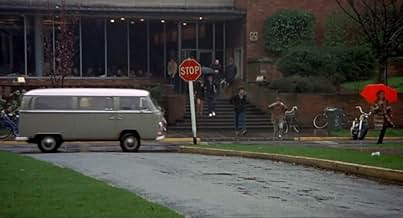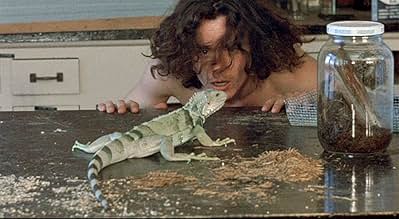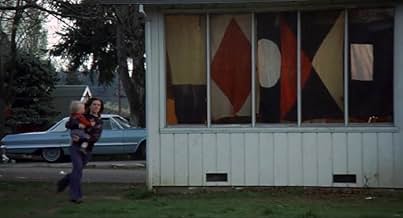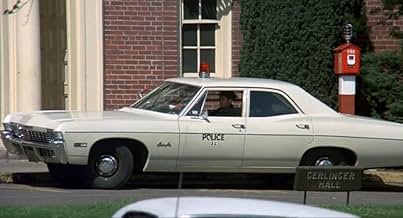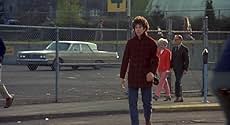NOTE IMDb
5,7/10
1,8 k
MA NOTE
Ajouter une intrigue dans votre langueThe star player of a college basketball team starts to go off the rails with an illicit love affair and his roommate going crazy to avoid the war draft.The star player of a college basketball team starts to go off the rails with an illicit love affair and his roommate going crazy to avoid the war draft.The star player of a college basketball team starts to go off the rails with an illicit love affair and his roommate going crazy to avoid the war draft.
- Réalisation
- Scénario
- Casting principal
- Récompenses
- 1 victoire et 1 nomination au total
Michael Warren
- Easly
- (as Mike Warren)
Lynette Bernay
- Dance Instructor
- (as Lynn Bernay)
Joseph Walsh
- Announcer #1
- (as Joey Walsh)
David Ogden Stiers
- Pro Owner
- (as David Stiers)
Mireille Machu
- Secretary
- (as I.J. Jefferson)
Avis à la une
Hector (William Tepper) is a star basketball player for the College basketball team he plays for, the Leopards. His girlfriend, Olive (Karen Black), does not know whether to stay with him or leave him. And his friend, Gabriel (Michael Margotta), who may have dropped out from school and become a protester, wants desperately not to get drafted for Vietnam.
This film marks Jack Nicholson's directorial debut, a chair he would not return to often. The casting was nothing special (though Karen Black is always great); the best part may be Bruce Dern as the coach. Some day he will get the full respect he deserves.
Roger Ebert found the film "disorganized", but also said it was "occasionally brilliant" with the performances being "the best thing in the movie", including the "laconic charm" of Tepper. This seems fair. For all the good things that can be said, it never really hits home hard enough, and may be dated.
This film marks Jack Nicholson's directorial debut, a chair he would not return to often. The casting was nothing special (though Karen Black is always great); the best part may be Bruce Dern as the coach. Some day he will get the full respect he deserves.
Roger Ebert found the film "disorganized", but also said it was "occasionally brilliant" with the performances being "the best thing in the movie", including the "laconic charm" of Tepper. This seems fair. For all the good things that can be said, it never really hits home hard enough, and may be dated.
10titov
This may be the only film that actually comes close to capturing on film the essentially uncapturable world of the American college experience of the late 60s-early 70s. Go ahead, name another movie that even approaches this one: "Getting Straight"? "RPM"? These are caricatures. "Return of the Secaucus Seven" has its moments, but that's a retrospective film about (self-obsessed) individuals more than a film about a time and a place depicted *in* that time and place. "Drive, He Said" portrays-- with subtlety and nuance where it should, and a swift kick in the shorts where that's the only appropriate way-- the anti-draft movement, the ambiguity of big-time college sports (especially when there's a war on), the sexual revolution of the period, and the general unreality of the day. Believe me, it was like that.
The whole cast deserves commendation (as does the director, of course) but particular praise should be reserved for Bruce Dern, as the basketball coach, and Karen Black, the hero's very unusual-- except for that time-- love interest. William Tepper, as the lead, also rates a real round of applause both for his perfect capturing of the student-athlete of the period and for actually playing real college basketball in the film (remember Anthony Perkins in "Tall Story"? Yikes!).
All in all, a classic of a kind-- and the last film someone currently in 6th grade should be writing comments on ("boring", "repellent"-- um, right, sonny, please go back to your Arnold movies). Why isn't this film available from imdb?
The whole cast deserves commendation (as does the director, of course) but particular praise should be reserved for Bruce Dern, as the basketball coach, and Karen Black, the hero's very unusual-- except for that time-- love interest. William Tepper, as the lead, also rates a real round of applause both for his perfect capturing of the student-athlete of the period and for actually playing real college basketball in the film (remember Anthony Perkins in "Tall Story"? Yikes!).
All in all, a classic of a kind-- and the last film someone currently in 6th grade should be writing comments on ("boring", "repellent"-- um, right, sonny, please go back to your Arnold movies). Why isn't this film available from imdb?
Not much to make of this directorial debut by would-be star actor and frequent attendee of Los Angeles Lakers games Jack Nicholson, "Drive, He Said," which doesn't so much get its title from the basketball played in the film as it does from a poem, "I Know a Man," by Robert Creeley, which is recited at the beginning as the college hoops game is broadcast on a TV in the background. Soon thereafter, the poem-reciting, counterculture youths dressed in camouflage paramilitary regalia invade the gymnasium of the game to put on a bit of performance art that's as vaguely against, or agitated by, rather, American militarism--specifically the Vietnam War--as is the rest of the picture. Seems the war is such a weight on these young men's minds that it drives one to insanity and another to waffle over whether he wants to really play basketball or not.
Neither character arc is very compelling, and the crazy one is over-the-top ridiculous. There are easier ways to avoid a draft, guys, whether it's for the NBA or USA. And poor Karen Black having to put up with this tomfoolery and, worse, replaying an attempted-rape climax as old as D. W. Griffith silent films and the Victorian literature he in turn stole it from. The entire film is as muddled as its basketball footage with barely a narrative to be found, and it's undoubtedly dated as an independent film from the early '70s.
On the other hand, there's enough here, to use a cliché from another sport, out of left field to be at least bemusing. Plus, at least the actors evidently know how to dribble and shoot enough to keep up with apparent real former collegiate athletes. The Leopards team's mascot is a real, caged leopard that occupies the sidelines. A lot here concerning caged animals and letting them loose, which is the sort of motif that goes for symbolism in this picture. At one point, a montage of slow-motion basketball footage is played to "The Star-Spangled Banner." As the making-of-video included on the Criterion disc claims, it also includes some guerilla filmmaking exploiting a real riot that broke out during filming at the University of Oregon, which fits seamlessly within the rest of the picture's aesthetics. The remainder of the movie mostly seems to merely revel in the Sexual Revolution, including a considerable amount of focus on male genitalia. Nicholson claims he wanted a "symphony of dicks" during a locker-room shower scene, which supposedly he had to compromise on, but not by much.
Neither character arc is very compelling, and the crazy one is over-the-top ridiculous. There are easier ways to avoid a draft, guys, whether it's for the NBA or USA. And poor Karen Black having to put up with this tomfoolery and, worse, replaying an attempted-rape climax as old as D. W. Griffith silent films and the Victorian literature he in turn stole it from. The entire film is as muddled as its basketball footage with barely a narrative to be found, and it's undoubtedly dated as an independent film from the early '70s.
On the other hand, there's enough here, to use a cliché from another sport, out of left field to be at least bemusing. Plus, at least the actors evidently know how to dribble and shoot enough to keep up with apparent real former collegiate athletes. The Leopards team's mascot is a real, caged leopard that occupies the sidelines. A lot here concerning caged animals and letting them loose, which is the sort of motif that goes for symbolism in this picture. At one point, a montage of slow-motion basketball footage is played to "The Star-Spangled Banner." As the making-of-video included on the Criterion disc claims, it also includes some guerilla filmmaking exploiting a real riot that broke out during filming at the University of Oregon, which fits seamlessly within the rest of the picture's aesthetics. The remainder of the movie mostly seems to merely revel in the Sexual Revolution, including a considerable amount of focus on male genitalia. Nicholson claims he wanted a "symphony of dicks" during a locker-room shower scene, which supposedly he had to compromise on, but not by much.
One of the more unusual movies I've ever seen is "Drive, He Said." Made in 1971 made by the same production company that made "Easy Rider" and "Five Easy Pieces" that made Jack Nicholson a star a year or two earlier.
This was the first film directed by Jack Nicholson. It's a combination basketball, free love, anti-draft movie that was filmed on the campus of the University of Oregon. It was not well-received at the time, and was somewhat infamous for its male frontal nudity scenes. The basketball skill level seemed very high.
It's basically the story of two friends--one a basketball star and Greek major who's hormones are raging and is undecided about a pro career. The other is a guy taking drugs to try to stay out of the draft, and basically he flips out.
I thought it was an interesting premise, but I found the speech of the main characters to be stilted. In some ways it captured the ethos of U. S. campuses in the Vietnam War era pretty well.
This was the first film directed by Jack Nicholson. It's a combination basketball, free love, anti-draft movie that was filmed on the campus of the University of Oregon. It was not well-received at the time, and was somewhat infamous for its male frontal nudity scenes. The basketball skill level seemed very high.
It's basically the story of two friends--one a basketball star and Greek major who's hormones are raging and is undecided about a pro career. The other is a guy taking drugs to try to stay out of the draft, and basically he flips out.
I thought it was an interesting premise, but I found the speech of the main characters to be stilted. In some ways it captured the ethos of U. S. campuses in the Vietnam War era pretty well.
Poorly developed and fragmented movie about a confused college basketball player with a host of predictably militant and/or cynically unhappy acquaintances characteristic of 1960s academia where the film is set. I'm not sure whether we are supposed to like or even care about the characters or not, but in any event I didn't feel much of either for any of them. Jack Nicholson directed this movie with a taste for profanity and nudity. I guess he thought he was being provocative and progressively mirroring the changing cultural mores of the time. He would have fared better by putting his energy into developing characterization and refining the script that he co-wrote instead. All in all a disappointing movie which left me with a feeling of indifference about it.
Le saviez-vous
- AnecdotesJack Nicholson's solo directorial debut. It was one of two post-Easy Rider (1969) Nicholson films that weren't released on any kind of home video until 2010. That year, the Criterion Collection released this movie and Un coin tranquille (1971) on DVD and Blu-ray as part of their "America Lost And Found - The BBS Story" box set.
- GaffesDuring the second basketball game, the writing on the Ohio Leopards jerseys frequently changes from "Leopards" to "Ohio" on a shot by shot basis.
- Crédits fousThe opening credits are typed so small, one can hardly read them. Sometimes the letters in the names are blurred because of their ultra-small size.
- ConnexionsFeatured in Skin: A History of Nudity in the Movies (2020)
Meilleurs choix
Connectez-vous pour évaluer et suivre la liste de favoris afin de recevoir des recommandations personnalisées
- How long is Drive, He Said?Alimenté par Alexa
Détails
Box-office
- Budget
- 800 000 $US (estimé)
Contribuer à cette page
Suggérer une modification ou ajouter du contenu manquant

Lacune principale
By what name was Vas-y, fonce (1971) officially released in Canada in English?
Répondre

